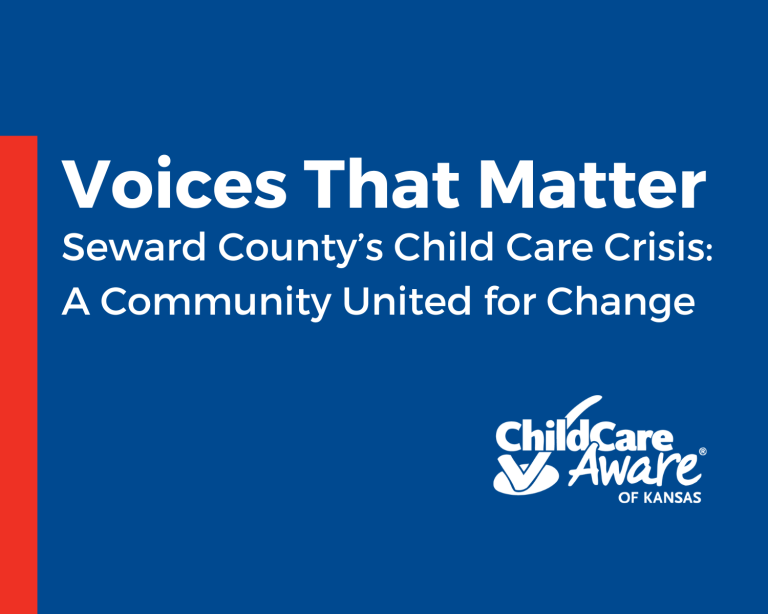Seward County’s Unique Challenges and Strengths
When asked to describe Seward County, Jan, a Community Outreach and Engagement Coordinator from Child Care Aware of Kansas, called it, “a patchwork quilt of a network” that is representative of the resilient, community-oriented spirit of Kansas. Seward County’s overall needs are high, but their child care needs stand out alarmingly, at just 19% of families meeting their child care needs. While availability of child care options stands as one of the most pressing needs in Seward County, its coalition leaders, families, and providers have also identified a variety of issues that demand to be met.
They see that not only is child care simply not available to many families, but providers are overwhelmed and underpaid, existing child care facilities are underfunded, and multilingual resources for their very diverse population are extremely limited.
Overwhelmed and Underpaid: The Struggles of Child Care Providers
Sarah, a coalition leader in Seward County, shared that as her coalition continually assesses the needs of the community, they find that parents and providers are overwhelmed. Lisa, a mother of children who have and continue to attend child care services in Seward, stated that finding consistent child care has been a constant challenge, and that she just hopes “to survive every week,” and that “not having [child care] is a nightmare.” This stress has led her to believe that it is often easier to rely on her community of friends and family than it is to rely on the child care system.
Additionally, Yanitza, a Spanish-speaking child care provider in Seward County, strongly believes that, “child care work is not equitably valued,” and the stress of financial hardship and a lack of funding for multilingual resources makes child care a difficult field for providers. In such a diverse county as this, a lack of diversity in resources can be devastating to not only parents and providers, but to children as well.
Building a Sustainable Future: Community Efforts and Advocacy
To provide sustainable, consistent, and quality child care, Sarah and Yanitza agree that funding for providers is essential. By having more and better availability of quality child care, Seward County would greatly relieve the stress of parents who have very few places to which they can turn for help.
Additionally, Yanitza, who has utilized multiple resources offered by Child Care Aware of Kansas, shared that addressing the needs for diverse training, workshops, and resources for families and providers will create a more equitable field. ”If we receive training in Spanish,” she said, “We can be better equipped to face every challenge that arises… If we are well-prepared, we will be able to teach children in the right way.”
Through a reflection of the diversity of the community in family and provider resources, children will certainly benefit, finding themselves in a position for optimal learning and growth.
Seward County is a community that is rich in the most important resource: its people.
Jan Kuckleman, Community Outreach and Engagement Coordinator, Child Care Aware of Kansas
As Seward County primes themselves for sustainable, long-term growth, it is necessary for this community to experience the same support from other agencies that they receive from one another. As Sarah expressed, “What we do could not be done without all of us.”
Hope shines at every turn as Seward County addresses the child care needs of its citizens. Its coalition leaders, families, and providers each see that there is more to be done, and they have the grit and gumption that it will take to continue to advocate for themselves and the needs of their community.
-

Casadie Smith
Casadie Smith, Director, StoryComm Solutions
Casadie Smith received her Master of Arts in Communication & Storytelling Studies from East Tennessee State University in 2023, where she focused on qualitative research and applied storytelling. Her years of varied experiences as a writer, creative, early childhood educator, curious mind, and much more have offered her unique insight into the importance of connecting people of all backgrounds through stories. Casadie currently works as a professional freelance storyteller, writer, researcher, and educator, and you can find more information about her services at https://www.casadiesmith.com.







